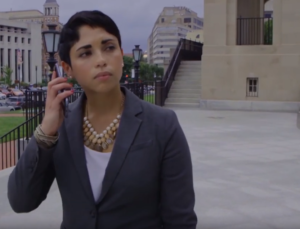Maryland U Visa Lawyer
A U Visa is a type of lawful immigration status that is available to individuals who are in the United States or outside the United States who have been victims of serious crimes within the United States, outlying territories, or in some cases military bases abroad.
It is categorized as a Nonimmigrant Visa, meaning that it does not automatically lead to permanent immigration status. It is valid only for four years and is a temporary status. However, after three years of physical presence in the United State with a U Visa status, the visa holder can apply for their green card and become a lawful permanent resident. A Maryland U Visa lawyer can help walk you through the process of applying. Call today to schedule a consultation and discuss your immigration case. En Español.
Quota on U Visas
 There is a quota of 10,000 U visas that can be issued each year not including derivative applicants. A principal applicant is a person who has actually been the victim of the crime and has been helpful with the investigation or prosecution of that crime. These individuals will actually apply for U-1 status.
There is a quota of 10,000 U visas that can be issued each year not including derivative applicants. A principal applicant is a person who has actually been the victim of the crime and has been helpful with the investigation or prosecution of that crime. These individuals will actually apply for U-1 status.
In some cases, if the victim applicant has family members, they can qualify for U Visa status as well as a derivative or as a rider on the principal applicant. This means the quota includes only the principal applicant, and the principal applicants can file for visas for their minor children. If the principal applicant is under 18 years old, they can file for siblings, if they are under 21, they can also file for parents. It is important to note that this quota is reached every year and there is generally a backlog, but a U Visa lawyer in Maryland can help ensure that you have submitted your application in a proper and timely manner. Learn more about the length of the case process here.
Issuing a U Visa
USCIS, the Vermont Service Center, is the particular office that is in charge of adjudicating and approving or denying U Visas. This is true even if an individual is in deportation proceedings in front of the immigration court. A person has to wait for the Vermont Service Center, specifically, the Violence Against Women Act (VAWA) unit in the Vermont Service Center to adjudicate them.
Creation of the U Visa
U Visas first emerged under the Violence Against Women Act, which has several provisions for immigrant victims of crimes involving specifically domestic violence. But the U Visa is available to any crime victim, man or woman.The philosophy behind the creation of the U Visa is to try to protect communities of immigrants or undocumented individuals from being afraid in contacting or cooperating with police when victims of a crime. It also exists to encourage positive community relations with police and law enforcement.
The philosophy of the U Visa is to create a bridge between law enforcement and immigrant communities and let them know, if they are victims of crimes, then not only should law enforcement not punish them for that sending them to Immigration and Customs Enforcement (ICE), but they may also have some affirmative benefits that would come out of cooperation with law enforcement. When applying for the U Visa, it is helpful for individuals to have a Maryland U Visa immigration attorney to help them with the application, as it can seem intimidating.
To law enforcement, they can use it as a tool to build bridges to immigrant communities that might otherwise be isolated from law enforcement services. And it is also a tool in general to encourage the cooperation of witnesses in reporting crimes and having more open dialogues with police and prosecutors. It can definitely be a positive tool for law enforcement.
Eligibility Requirements
 The basic threshold requirement for the U Visa is that a person is the victim of a crime in the United States. The second requirement after being a victim of a crime is that the person was cooperative with any investigation or prosecution that occurred regarding the case.
The basic threshold requirement for the U Visa is that a person is the victim of a crime in the United States. The second requirement after being a victim of a crime is that the person was cooperative with any investigation or prosecution that occurred regarding the case.
In some cases, that might mean calling the police, and if they never found the perpetrator, then maybe there were never charges filed. If a person never had to go court, it still qualifies as that person’s cooperation ended at the time the police stopped asking them for help. But in some cases where there is a prosecution and the prosecutor wants to go forward, it is important a person cooperates throughout the process. There does not have to be a prosecution but if there is, a person does need to cooperate for the duration of the case.
There are other eligibility requirements, such as that a person has to be admissible to the United States. There is an expansive waiver of inadmissibility, and it is the biggest waiver in all of immigration law. If a person has prior criminal convictions, prior orders of deportation, or other immigration violations in their past, sometimes the U Visa can be a viable option for these people as there is a waiver that is easy to access. These prior options do not automatically disqualify a person. There are cases where someone’s grounds of inadmissibility will lead to a denial in the case. If a person has issues in their past, the extensive waiver could still allow potential qualification for the U Visa. An attorney can help you understand the eligibility requirements and case process of the U Visa.
Crimes Qualifying U Visa
Because criminal statutes differ from state to state, there is not one concrete list of crimes that would actually qualify. If a person’s crime is not explicitly listed on the list of U Visa qualifying crimes, they should talk to an attorney to see if it may qualify nonetheless.
Some examples of qualifying crimes include felonious assaults, domestic violence, stalking, witness tampering, or extortion. Armed robbery is a common crime seen that is technically not qualifying on the list, but in many cases if there was a weapon involved or if there was physical assault that occurred during armed robbery, it could have been charged as an armed robbery. If an attorney can help the applicant prove to the government that it could have been charged as a felonious assault under federal law, then it is easy to get it to qualify. Even if a person’s crime is not explicitly on the list, they should talk to an experienced Maryland U Visa attorney to see if they may be able to fit it within the framework.
